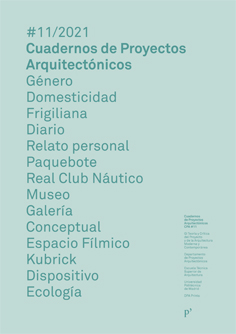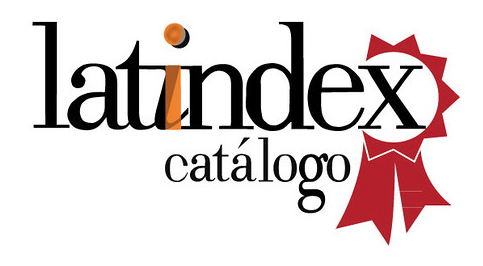24 Galleries, a museum: The Survey as a Design Tool
DOI:
https://doi.org/10.20868/cpa.2021.11.4832Palabras clave:
Exhibitions, Conceptual, Gallery, Museum, DisplayResumen
Abstract
In the mid-1970s in Madrid, it’s possible to identify a series of experiences that went beyond traditional architectural practice, the established domains of academia and the usual dynamics of editorial and institutional activities. The art galleries, with their publications, curators, collectors, critics and visitors, proved to be a prolific setting for an informal network of agents and institutions that, through programming events of various formats, instituted an active mediation in the critical formation of the citizenry. The seminar “Nuevos Comportamientos Artísticos” (“New Artistic Behaviors”), held at the Madrid’s German Institute in 1974, was one of these events. Its gallery proved to be a pioneer in the exhibition of practices linked to art and design, which openly promoted their expansion into other fields of knowledge based on a local interpretation of what was noticed in Spain as “conceptual art”. The action “Survey of 24 art galleries in Madrid,” was the contribution to the seminar of the multidisciplinary collective Grup de Treball (GdT), and serves here to illustrate the activation of this network of galleries as a ‘counter-project’. An act of design, based on Peter Eisenman’s definition of ‘Conceptual Architecture’, that transcends art and controversies to offer an alternative. The exhibition of the survey’s answers accumulated the values of language, interface, platform and medium necessary to redefine the framework of relations between its participants. Whose association gathered a community with the capacity to be a Museum: a dematerialized, fragmented and heterogeneous institution that challenged conventional relationship between art, citizenry and the market.
Descargas
Referencias
Bennett, Tony. Birth of the museum: history, theory, politics. London: Routledge, 1995.
Combalía, Victoria. La poética de lo neutro: análisis y crítica del arte conceptual. Barcelona: Anagrama, 1975.
Doucet, Isabelle. The Practice Turn in Architecture. Brussels after 1968.Farnham: Ashgate Publishers, 2015.
Doucet, Isabelle. “Counter- Projects and the Postmodern User” en: Kenny Cupers (ed.), Use Matters: An Alternative History of Architecture. Londres: Routledge, 2013.
Douglas, Mary. How Institutions Think. New York: Syracuse University Press, 1986.
Dressler, Iris y Hans D. Christ. Subversive Practices. Art under Conditions of Political Repression: 60s-80s / South America / Europe. Sttutgart: Hatje Cantz, 2010.
Eisenmann, Peter. “Notes on Conceptual Architecture: Towards a definition” Design Quarterly 78-79, (1970):1-5.
Eisenman, Peter. “Notes on Conceptual Architecture II A”. Environmental Design Research Association, Vol 2, (1973): 323.
Eisenman, Peter. “From Object to Relationship: The Casa del Fascio by Terragni,” Casabella, 344, pp. 38–41, 1970.
Eisenman, Peter. “From Object to Relationship II: Giuseppe Terragni, Casa Giuliani Frigerio,” Perspecta, nº 13/14, (1971): 36–61.
Jarzombek, Mark. “A Conceptual Introduction to Architecture”. Log, nº15,(Winter 2009): 16-20.
Last, Nana. “Conceptualism’s (Con)quests: On Reconceiving Art and Architecture”. Harvard Design Magazine, nº19, (Fall 2003/Winter 2004):19-23.
Lippard, Lucy. Six Years: The Dematerialization of the Art Object from 1966 to 1972. New York: Praeguer, 1973.
Lum, Eric. “Conceptual Matter: On Thinking and Making Conceptual Architecture”. Harvard Design Magazine, nº19, (Fall 2003/Winter 2004):1-6.
Malraux, André. El Museo Imaginario. Madrid: Cátedra, 2017.
Marchán Fiz, Simón. Del arte objetual al arte de concepto, 1960-1974, Madrid: Akal, 1984.
Mercader, Antoni, Parcerisas, y Roma, Valentín. Grup de Treball. Barcelona: MACBA, 1999.
O’Doherty, Brian. Inside the White Cube, The Ideology of the gallery Space. Santa Monica, San Francisco: The Lapis Press, 1986.
Parcerisas, Pilar. Conceptualismo(S) poéticos políticos. Madrid: Akal, 2007.
Queralt, Rosa, y Combalia, Victòria. El Arte Sucede. El Origen De Las Prácticas Conceptuales En España, 1965-1980. Madrid: Museo Nacional Centro de Arte Reina Sofía, 2005.
Rancière, Jacques. Aesthetics and Its Discontents. Malden: Massachusetts, 2009.
Descargas
Publicado
Número
Sección
Licencia
1. Los autores conservan los derechos de autor y garantizan a la revista el derecho de una Licencia Creative Commons Atribución-NoComercial-SinDerivar 4.0 Internacional que permite a otros compartir el trabajo con un reconocimiento de la autoría.
2. Los autores pueden establecer por separado acuerdos adicionales para la distribución no exclusiva de la versión de la obra publicada en la revista (por ejemplo, situarlo en un repositorio institucional o publicarlo en un libro).












